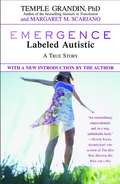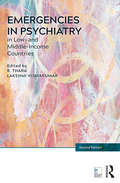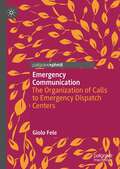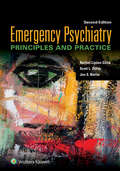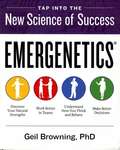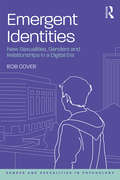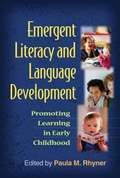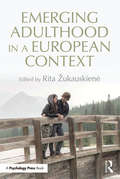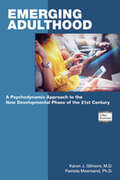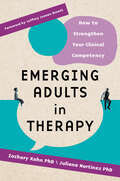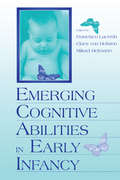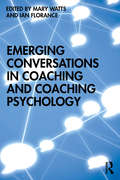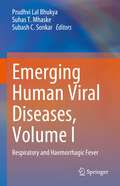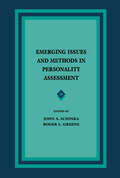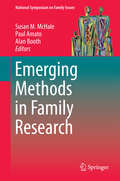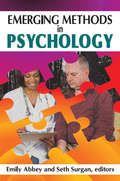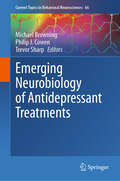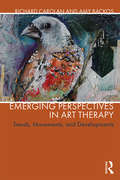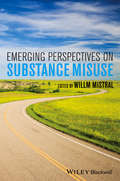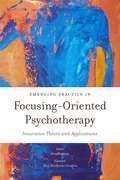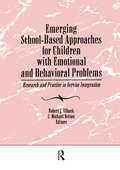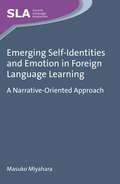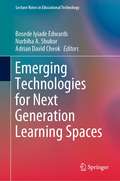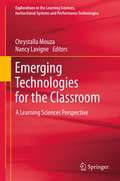- Table View
- List View
Emergence: Labeled Autistic
by Temple Grandin Margaret M. ScarianoA true story that is both uniquely moving and exceptionally inspiring, Emergence is the first-hand account of a courageous autistic woman who beat the odds and cured herself. As a child, Temple Grandin was forced to leave her "normal" school and enroll in a school for autistic children. This searingly honest account captures the isolation and fears suffered by autistics and their families and the quiet strength of one woman who insisted on a miracle.
Emergencies in Psychiatry in Low- and Middle-income Countries
by Lakshmi Vijayakumar R. TharaThere is a need to not only understand psychiatric emergencies in low- and middle-income countries but also to formulate logical and acceptable forms of intervention. This book gives the reader an overview of the kinds of psychiatric emergencies that can occur and the strategies employed to manage these in developing countries. The book covers anxiety disorders, psychotic disorders, personality disorders, substance abuse disorders, grief, suicidal behaviour and psychiatric emergencies following disasters. It also deals with special population groups, such as women, children and the elderly, who require different modes of intervention.
Emergency Communication: The Organization of Calls to Emergency Dispatch Centers
by Giolo FeleThis book explores communication in emergency call and response centers, taking an approach drawn from Conversation Analysis to examine how call-takers answer calls and the ways in which dispatch is issued in different contexts. It offers an original contribution to the study of the organization of emergency calls, the ways such calls are treated, and some of the practical problems that emerge when dealing with them. The author offers a systematic review of studies in the international field of the organization of emergency calls, while at the same time providing fresh case studies, illustrated with empirical materials, taken from audio- and video- recordings of the everyday activities of call and response centers. This book will be of interest to students and scholars of social interaction and may be appreciated by all scholars and practitioners working on the social management of emergency situations, including in fields such as Sociolinguistics and Pragmatics.
Emergency Psychiatry
by Arjun Chanmugam Mba Patrick Triplett Gabor Kelen Patrick TriplettMany healthcare providers based in primary care, emergency care or other acute care environments encounter patients with psychiatric problems. These presentations can be difficult to manage and often pose significant challenges. A better understanding of most common psychiatric problems can greatly aid both providers and patients. Emergency Psychiatry reviews a wide range of common psychiatric disorders and provides succinct management guidelines. Written by emergency physicians and psychiatrists, Emergency Psychiatry is a rapid reference for the acute management of psychiatric disorders for all care providers, including, but not limited to, emergency physicians, internists, psychiatrists, social workers, family practitioners and other primary care providers.
Emergency Psychiatry: Principles And Practice
by Rachel Lipson Glick Jon S. Berlin Avrim Fishkind Scott L. ZellerThe field of emergency psychiatry is complex and varied, encompassing elements of general medicine, emergency medicine, trauma, acute care, the legal system, politics and bureaucracy, mental illness, substance abuse and addiction, current social issues, and more. In one comprehensive, highly regarded volume, Emergency Psychiatry: Principles and Practice brings together key principles from psychiatric subspecialties as well as from emergency medicine, psychology, law, medical ethics, and public health policy. Leading emergency psychiatrists write from their extensive clinical experience, providing evidence-based information, expert opinions, American Psychiatric Association guidelines, and case studies throughout the text. This fully up-to-date second edition covers all of the important issues facing psychiatry residents and practitioners working in today’s emergency settings, or who encounter psychiatric emergencies in other medical settings.
Emergenetics (R)
by Geil BrowningWho you are today is a result of certain characteristics that have emerged from your life experiences, plus the genetics with which you were born. This interplay between nature and nurture is the foundation of Emergenetics®, a brain-based approach to personality profiling that gives you the keys you need to discover not only your own natural strengths and talents, but also those of others. You will discover your thinking style (Conceptual, Social, Analytical, or Structural) and your behavioral set points (your degree of Expressiveness, Assertiveness, and Flexibility). These insights will help you recognize how you approach new situations, how you get things done, how others see you, how to enhance relationships, and how to communicate with people who are not like you. Applying Emergenetics® to the workplace will enable you to make optimal career decisions, boost your creativity and performance, increase profits, make better decisions, assemble "brain trust" teams, write effective performance reviews, make presentations that appeal to everyone, sell to all kinds of customers, and motivate all kinds of employees. Emergenetics® offers invaluable insights instantly, and paves the way to personal growth, satisfaction, and success.
Emergent Identities: New Sexualities, Genders and Relationships in a Digital Era (Gender and Sexualities in Psychology)
by Rob CoverExamining the emergence of new sexual and gender identities in the context of an ever-changing digital landscape, Emergent Identities considers how traditional, binary understandings of sexuality and gender are being challenged and overridden by a taxonomy of non-binary, fluid classifications and descriptors. In this comprehensive account of the ongoing shift in our understandings of gender and sexuality, Cover explores how and why traditional masculine/feminine and hetero/homo dichotomies are quickly being replaced with identity labels such as heteroflexible, bigender, non-binary, asexual, sapiosexual, demisexual, ciswoman and transcurious. Drawing on real-world data, Cover considers how new ways of perceiving relationships, attraction and desire are contesting authorised, institutional knowledge on gender and sexuality. The book explores the role that digital communication practices have played in these developments and considers the implications of these new approaches for identity, individuality, creativity, media, healthcare and social belonging. A timely response to recent developments in the field of gender identity, this will be a fascinating read for students of Psychology, Gender Studies, Media and Cultural Studies, and related areas as well as professionals in this field.
Emergent Literacy and Language Development
by Paula RhynerThis concise, accessible book explores the connection between language acquisition and emergent literacy skills, and how this sets the stage for later literacy development. Chapters address formative early experiences such as speaking and listening, being read to, and talking about print concepts and the alphabet. Written for early childhood professionals, reading specialists, and speech language pathologists, the book describes effective assessment and instructional approaches for fostering language learning and emergent literacy in typically developing children and those at risk for language delays. Vivid case examples illustrate specific ways to collaborate with parents to give all children a strong foundation for school readiness and success.
Emerging Adulthood in a European Context
by Rita ŽukauskienėEmerging adulthood has been identified as an important developmental stage, characterised by identity exploration, instability and open possibilities, in which young people are no longer adolescents but have not yet attained full adult status. This ground-breaking edited collection is the first book to offer a comprehensive overview of emerging adulthood in a European context, which includes a comparison of findings in 9 different European countries and the USA. <P><P> Each chapter, written by a leading European researcher, describes the socio-demographic characteristics of emerging adults, reviews the state of the field, synthesises new findings, and provides suggestions for how to move forward in research, interventions, and policy. The book examines how the traditional domain markers of adulthood, such as finishing education and caring for children, have changed. It also highlights how different factors such as gender, working status, living arrangements, romantic status and parental educational background affect the importance assigned to each set of adulthood criteria. The theory of emerging adulthood is further developed by considering how Arnett’s emerging adulthood, Erikson’s early adulthood, and Robinson’s theory of early adult crisis fit together, and data is provided to support the new framework given. <P><P> The book will be of great interest to researchers interested in these developmental transitions, and to advanced students of Emerging Adulthood on developmental psychology and lifespan courses, and related disciplines.
Emerging Adulthood: A Psychodynamic Approach to the New Developmental Phase of the 21st Century
by M. D. And Pamela Meersand Karen J. GilmoreWhat makes an adult? Is it living independently, having a stable career path, getting married, or becoming a parent? In the digital age, particularly in Western societies, such traditional markers have been increasingly postponed and redefined. Thus, the concept of emerging adulthood, first described by Jeffrey Jensen Arnett, Ph.D., is a period between adolescence and adulthood properly characterized by identity exploration, instability, self-focus, feeling in-between, and a sense of wide-open possibilities. <P><P> Many contemporary researchers have defined emerging adulthood as the period between ages 18 and 29 years, but this new volume argues that it is more useful to look at early emerging adulthood, or late adolescence (ages 18–23), and later emerging adulthood (ages 24–29) separately. Although certain broad trends characterize the entire decade in question (role experimentation, focus on self-discovery), the developmental capacities and tasks of the earlier years are distinct from those of the mid- to late 20s.
Emerging Adults in Therapy: How to Strengthen Your Clinical Competency
by Zachary Kahn and Juliana MartínezTheoretical, sociocultural, and clinical essays on the psychology of today’s young adults. “Emerging adulthood” (EA) describes a developmental period between adolescence and adulthood, typically spanning ages 18–29. It’s a rough time for most people—perhaps now more than ever. Emerging Adults in Therapy contains contributions from various psychologists and psychiatrists (many of whom are on the younger side), with diverse backgrounds and specialties related to EA. The book’s editors, Zachary Kahn and Juliana Martinez, are both licensed psychologists in New York working predominantly with young adults in private practice. Much of the focus here is on the psychological impacts of the COVID-19 pandemic and the reckoning on racial injustice that characterize this time period. Other sections discuss theories of this age band and describe different treatment approaches specialized for young adults. This book should appeal to training and practicing clinicians working with young people, as well as young adults and their parents who are interested in both the psychological challenges and therapeutic practices that can help. Contributors include: Francis Bartolomeo · Anna-Lee Stafford · Andrew Gerber · Steve Tuber · Karen Tocatly · Chantel T. Ebrahimi · Alexandria G. Bauer · Denise Hien · Lillian Polanco-Roman · Marjorine Henriquez-Castillo · Kathleen Isaac · Elisa Lee · Carolina Franco · Annelisa Pedersen · Peter Lemons · Elizabeth F. Baumann · Zoe Berko · Leora Trub · Vendela Parker · Zachary Geller · Danielle La Rocco · Kristin P. Wyatt · Colleen M. Cowperthwait · Kateri Berasi · Sherina Persaud
Emerging Cognitive Abilities in Early infancy
by Mikael Heimann Claes Von Hofsten Francisco LacerdaWritten by a group of developmental scientists, this book debates cognitive achievements in early infancy from a multidisciplinary perspective. The editors combine knowledge from different areas of infant development research to present an integrated view of the cognitive abilities emerging in early infancy. The chapters are arranged in a sequence that best conveys to the reader the line of reasoning that emerged during the development of this book. The book opens with chapters dealing with fundamental and general aspects of cognitive development, sweeps through the specific theme of language acquisition, and closes by returning to general questions concerning different representation modalities.
Emerging Conversations in Coaching and Coaching Psychology
by Mary Watts; Ian FloranceThis rich collection offers new perspectives on the future of coaching and coaching psychology, with insight from a broad range of contributors reflecting a wide variety of viewpoints. It captures the ongoing evolution of coaching practice, inviting contribution to conversations as they unfold. Mary Watts and Ian Florance skillfully bring together authors from backgrounds in law, finance, education, psychology and HR to examine the nature of change and assess current and future developments. Emerging Conversations in Coaching and Coaching Psychology considers influences from within coaching itself, discussing topics including ethics, diversity, supervision and reflective learning, and from other disciplines, assessing the offerings of psychometric assessment, trauma studies and neuroscience. It also considers the impact of social changes as seen in business, education and leadership, and concludes with a look at the future of coaching. This book will be of great interest to coaches and trainee coaches interested in changes and developments in the field, who aren’t afraid to ask questions and who are open to reflecting on their own assumptions and approaches to practice.
Emerging Human Viral Diseases, Volume I: Respiratory and Haemorrhagic Fever
by Prudhvi Lal Bhukya Suhas T. Mhaske Subash C. SonkarThe first volume of the book-Emerging Human Viral diseases presents pathogenesis, diagnostics, and therapeutic strategies against viral respiratory and hemorrhagic fever diseases. The initial chapter discusses the underlying factors contributing to the emergence of these viral diseases. The subsequent chapters introduce structure, composition, and organization of viral genomes, and provide insight into function of important viral proteins. It also discusses the host factors that influence the outcome of viral infection and host immune response to the infections caused by these viruses. The book also discusses clinical manifestation and strategies for the prevention of virus diseases and highlights the recent technical advances in the diagnosis of virus diseases, prevention, and control strategies for viral infections. This timely book offers valuable resource for the scientists working in the field of emerging viral infections and those involved in preventing, controlling, and managing viral diseases.
Emerging Issues and Methods in Personality Assessment
by John A. Schinka Roger L. GreeneThis book constitutes a collection of articles that were written for, and recently published as, special sections in three consecutive issues of the Journal of Personality Assessment. Part I provides lucid commentaries on the current status of and future issues regarding the Rorschach and MMPI-2 and other instruments, including the Minnesota Multiphasic Personality Inventory -- Adolescent (MMPI-A), the Interpersonal Adjective Scales (IAS-R), the Inventory of Interpersonal Problems -- Circumplex version (IIP-C), the revised NEO Personality Inventory (NEO-PI-R), and the third edition of the Millon Clinical Multiaxial Inventory (MCMI-III). The authors not only participated in the dvelopment of the instruments, but continue to lead the research effort in their application in both clinical and research settings. Part II addresses several issues that have been recurring themes, and often topics of debate, in the research and professional literature. The contributors discuss the impact of the five-factor model on personality assessment, the issue of deception in personality assessment, and various critical issues in the measurement of mood states. Other articles focus on the integration of the MMPI-2 and Rorschach and the process that clinicians should follow when applying scientific knowledge to clinical practice. Part III is primarily devoted to overviews of several statistical methods that are employed infrequently in personality assessment research, but have great potential in contributing to the understanding of the complex data sets often encountered in the measurement and study of personality. These articles serve as both an introduction and a brief tutorial for personality researchers who are unfamiliar with the subject matter. They are valuable references that will form the basis for evaluating the appropriate use of these methods in published research in their areas of interest.
Emerging Methods in Family Research
by Alan Booth Susan M. Mchale Paul AmatoThe family can be a model of loving support, a crucible of pathology, or some blend of the two. Across disciplines, it is also the basic unit for studying human relationships, patterns of behavior, and influence on individuals and society. As family structures evolve and challenge previous societal norms, new means are required for understanding their dynamics, and for improving family interventions and policies. Emerging Methods in Family Research details innovative approaches designed to keep researchers apace with the diversity and complexities of today's families. This versatile idea-book offers meaningful new ways to represent multiple forms of diversity in family structure and process, cutting-edge updates to family systems models and measurement methods, and guidance on the research process, from designing projects to analyzing findings. These chapters provide not only new frameworks for basic research on families, but also prime examples of their practical use in intervention and policy studies. Contributors also consider the similarities and differences between the study of individuals and the study of family relationships and systems. Included in the coverage: Use of nonlinear dynamic models to study families as coordinated symbiotic systems. Use of network models for understanding change and diversity in the formal structure of American families. Representing trends and moment-to-moment variability in dyadic and family processes using state-space modeling techniques. Why qualitative and ethnographic methods are essential for understanding family life. Methods in multi-site trials of family-based interventions. Implementing the Multiphase Optimization Strategy (MOST) to analyze the effects of family interventions. Researchers in human development, family studies, clinical and developmental psychology, social psychology, sociology, anthropology, and social welfare as well as public policy researchers will welcome Emerging Methods in Family Research as a resource to inspire novel approaches to studying families.
Emerging Methods in Psychology (History And Theory Of Psychology Ser.)
by Emily Abbey Seth SurganThe motivation for this volume in the History and Theory of Psychology series is to look across sub-disciplines within psychology and highlight instances where researchers transcended the tendency to think about methodology along traditional lines. Contributors have located examples of researchers who built upon existing ideas to create methods true to their interests and theoretical convictions.Emerging Methods in Psychology shows how a discipline creates new methods and carves out possibilities that not only generate data, but also advance knowledge of human psychological functioning. It concentrates on showcasing the possibilities that exist when the researcher focuses on the relationship between theory, method, and data.The question of what kind of expertise is required is a key issue. This is particularly the case in psychology where the tradition of standardizing methods over the last century has served to stabilize research questions. Knowledge creation is deeply affective and ambiguous rather than the secure accumulation of data by a socially legitimized procedure. This innovative volume moves beyond psychology as social engineering into new varieties of social knowledge.
Emerging Neurobiology of Antidepressant Treatments (Current Topics in Behavioral Neurosciences #66)
by Michael Browning Trevor Sharp Philip J. CowenThis volume is unique in bringing the exciting range of antidepressant treatment developments together with a focus on their neurobiological mechanisms and how these interact with the known pathophysiology of depression. Current evidence for treatment efficacy is reviewed together with a discussion of where in the management pathway of this common condition, these new approaches might take their place.
Emerging Perspectives in Art Therapy: Trends, Movements, and Developments
by Richard Carolan Amy BackosEmerging Perspectives in Art Therapy aims to document newly emerging trends in the field of art therapy and to offer a vision of the future practices. This exciting new volume contains a diverse selection of chapters written to examine the current transitional phase of the profession where new paradigms of thinking and research methods are emerging due to the continued examination of old assumptions and development of new knowledge. Specific attention is paid to emergent knowledge in the areas of neuropsychological applications, philosophical foundations, research, multicultural and international practices, and art as therapy in allied professions.
Emerging Perspectives on Substance Misuse
by Willm MistralCopy - Web Catalog: Emerging Perspectives on Substance Misuse addresses theoretical, practice and policy issues with regard to the problematic use of alcohol and illegal drugs. Comprises chapters from some of the most internationally well-known academics and practitioners representing a range of different specializations and perspectives in the fieldPresents a wide range of emerging evidence-based perspectivesIncludes content relevant for researchers, practitioners, and policy makers who work with individuals or policy related to drug and alcohol misuseAreas covered include - gender and substance use, working with children and families of substance misusers and the emerging recovery movement
Emerging Practice in Focusing-Oriented Psychotherapy: Innovative Theory and Applications
by Karen Whalen Kenichi Itoh Leslie Ellis Heinz-Joachim Feuerstein Emmanuil Vantarakis Bernadette Lamboy Salvador Moreno López Catherine Garnett Doralee Grindler Katonah Mia Leijssen Isabel Gascon Mary K. Armstrong Jan Winhall Joan Lavender Jeffrey J. Schiffer Glenn Fleisch Susanne Vahrenkamp Mako Hikasa Mary Hendricks Gendlin Kevin Mcevenue Astrid Schillings Greg Madison Joan Klagsbrun Eunsun Joo Shirley TurcotteEmerging Practice in Focusing-Oriented Psychotherapy brings together some of the world's most influential contemporary psychotherapists in the field to look at the future of Focusing-oriented approaches. Focusing-Oriented Psychotherapy - a form of therapy that involves listening to the innate wisdom of the body - is a dynamic and growing field that has evolved greatly since Eugene Gendlin first published the text Focusing-Oriented Psychotherapy in 1996. This book explores recent innovations such as Focusing-Oriented Psychotherapy as a response to trauma, Wholebody Focusing, and how Focusing has been adapted in Japan and South Korea. One section looks at specific contemporary issues and emerging practical applications of Focusing-Oriented Psychotherapy, such as how Focusing can be used in wellbeing counselling and to help decision making processes in counselling and therapy. By offering new alternatives to working effectively with difficult issues and specific client groups, this volume will appeal to a broad range of therapists, coaches, and other practitioners. Jessica Kingsley Publishers also publishes a companion volume, Theory and Practice of Focusing-Oriented Psychotherapy: Beyond the Talking Cure, edited by Greg Madison [9781849053242].
Emerging School-Based Approaches for Children With Emotional and Behavioral Problems: Research and Practice in Service Integration
by C Michael Nelson Robert J IllbackIt is becoming recognized that the multiple and complex problems of children with emotional and behavioral problems and their families exceed the capacity of any single service system. Emerging School-Based Approaches for Children With Emotional and Behavioral Problems presents educators and social service practitioners with innovative programs and practices for these children while in school with emphasis on inter-service collaboration. The book fulfills a growing need for an organized discussion of how the integrated service paradigm can be applied in the context of school settings. Special consideration is given to the issues and problems that are idiosyncratic to schools as institutions. Emerging School-Based Approaches for Children With Emotional and Behavioral Problems shows school administrators, teachers, and child service providers conceptual, practice, and research aspects of integrated service programs in school settings. Professionals gain insight for planning organizational change as prominent experts and practitioners share their work across a range of issues and geographic sites. They explore these topics: systems of care for children and families schools as health delivery sites parent involvement for students with emotional and behavioral disorders program planning and evaluation planned organizational changeChapters provide readers with general information about the features of an integrated approach, provide practical examples of exemplary programs, and consider organizational change issues that can facilitate or impede movement toward a more collaborative approach. Programs presented focus on the development of more broad-based community services, less restrictive child placement, prevention of hospitalization and out-of-home placement, interagency collaboration, flexible and individualized services, and cost containment and efficiency. The integrated service movement in children’s services holds much promise as a means to create more comprehensive and coordinated school-based systems of care for children and families. Special education teachers and administrators, school and child clinical psychologists, and school counselors will find Emerging School-Based Approaches for Children With Emotional and Behavioral Problems fundamental to their understanding of the integrated systems approach and a helpful guide as they undergo their own organizational changes.
Emerging Self-Identities and Emotion in Foreign Language Learning
by Masuko MiyaharaThis book uses a narrative-oriented approach to shed light on the processes of identity construction and development among Japanese university students of English. The research highlights the instrumental agency of individuals in responding to and acting upon the social environment, and in developing, maintaining and/or reconstructing their identities as L2 users. The study offers unique insights into the role of experience, emotions, social and environmental affordances in shaping their personal orientations to English and self-perceptions as English learner-users. It also examines individuals' responses to these factors and discusses fluctuations in their motivations. The additional value of this book lies in its detailed account of methodological procedures, challenges and ways to overcome obstacles encountered when undertaking qualitative longitudinal studies.
Emerging Technologies for Next Generation Learning Spaces (Lecture Notes in Educational Technology)
by Adrian David Cheok Bosede Iyiade Edwards Nurbiha A. ShukorThis book discusses the development of the next generation learning spaces with emerging technologies. These spaces result from the combined needs of classroom stakeholders, such as instructors and learners, with classroom elements, such as tools and technologies, pedagogy and content. The book presents discussions and studies on issues, possibilities and implications of these changes for next generation education. Novel ideas, and studies on these all-encompassing, blended roles of technologies in next generation learning spaces are clearly presented. Suggestions on how the benefits they offer can be maximized are also discussed. Engaging learning technologies have remained central in education for assisting instructors to teach and learners to learn, more effectively. However, recent technological growth is creating a system in which previous divides between key classroom concepts and stakeholders are getting progressively blurred. This is giving rise to next generation learning spaces where elements and stakeholders are blended into one. The book addresses the future of learning environments based on these perspectives.
Emerging Technologies for the Classroom
by Chrystalla Mouza Nancy LavigneThis book provides contemporary examples of the ways in which educators can use digital technologies to create effective learning environments that support improved learning and instruction. These examples are guided by multiple conceptual and methodological traditions evolving from the learning sciences and instructional technology communities as well as other communities doing important work on learning technologies. In particular, the book provides examples of technology innovations and the ways in which educators can use them to foster deep understanding, collaboration, creativity, invention, and reflection. Additional examples demonstrate the ways in which emerging mobile and networked technologies can help extend student learning beyond the confines of the classroom wall and support student-directed learning and new media literacies.
